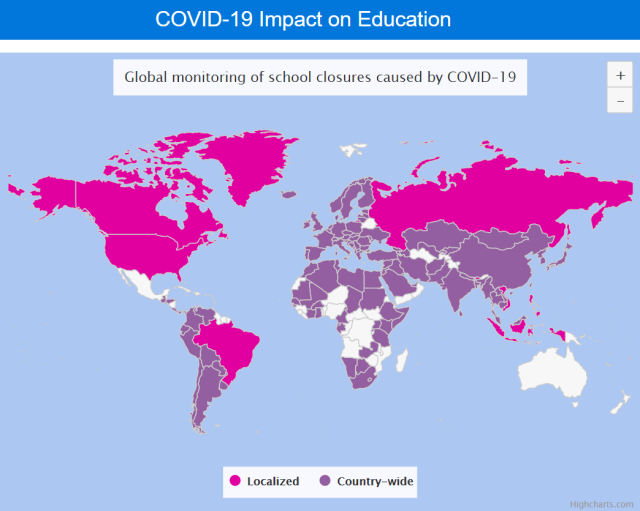The number of children, youth and adults not attending schools or universities because of COVID-19 is soaring. Governments all around the world have closed educational institutions in an attempt to contain the global pandemic.
According to UNESCO monitoring, over 100 countries have implemented nationwide closures, impacting over half of world’s student population. Several other countries have implemented localized school closures and, should these closures become nationwide, millions of additional learners will experience education disruption.
UNESCO is providing immediate support to countries as they work to minimize the educational disruption and facilitate the continuity of learning, especially for the most vulnerable.

Note: Figures correspond to number of learners enrolled at pre-primary, primary, lower-secondary, and upper-secondary levels of education [ISCED levels 0 to 3], as well as at tertiary education levels [ISCED levels 5 to 8]. Enrolment figures based on latest UNESCO Institute for Statistics data.
(*)
Bolivia, Cayman Islands, Equatorial Guinea, Guinea-Bissau, Iraq, Somalia, United Republic of Tanzania, and Venezuela: data on enrolment in tertiary education programmes is not available.
China: schools have started opening, but the majority remain closed.
Finland: Pre-primary education and grades 1–3 will continue for the children of parents working in sectors critical to the functioning of society, as well as for children with special needs from pre-primary to upper secondary education. Early Childhood Education and Care will be provided for all children, whose parents are unable to arrange their care at home. In other levels of education, contact teaching can continue, if considered necessary for the completion of studies.
Honduras: While all schools are closed, universities have the choice to remain open or not.
Iceland: primary schools can remain open if classes of under 20 children can be assured.
Japan: Universities currently on school spring break, and hence closures not related to the coronavirus.
Republic of Korea: Following an initial postponement of 2 weeks, universities have started the academic year. Group and face-to-face classes are strongly discouraged, and universities are offering online classes.
Romania: Most universities remain open.
Sweden: National closure of all upper secondary educational institutions and universities.


